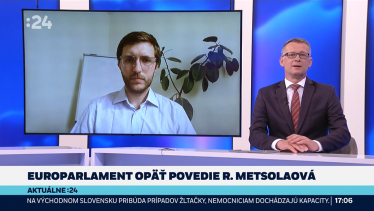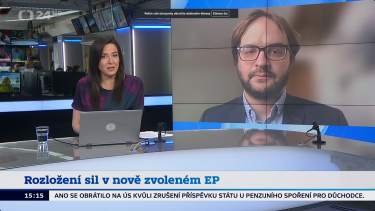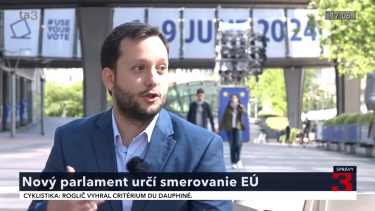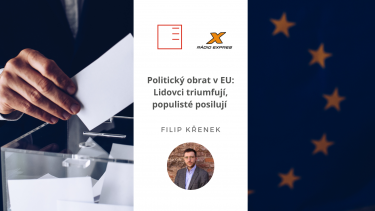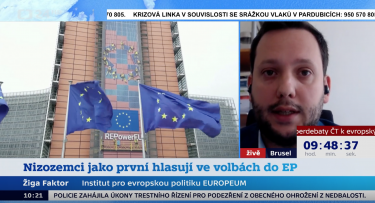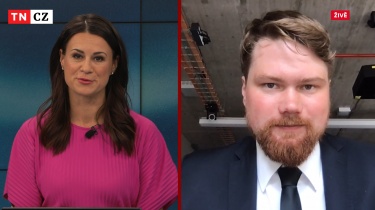STVR | The European Parliament will once again be led by Roberta Metsola
Roberta Metsola, a member of the European People's Party, has once again been elected President of the European Parliament. She was elected at the first session of the new European Parliament, with an overwhelming majority of MEPs voting in her favor. For Slovak STVR comments Filip Křenek, an analyst at EUROPEUM Institute.
Show more
TASR | Slovakia will have only one female MEP in the European People's Party
After the June European elections, Slovakia will have its weakest representation in the largest political group of the European Parliament - the European People's Party - since joining the EU in 2004. The only MEP in the EPP faction will be Miriam Lexmann from the Christian Democratic Movement. For the Slovak News Agency commented Žiga Faktor, head of the Brussels office and deputy director of EUROPEUM Institute.
Show more
ČT24 | The balance of power in the newly elected European Parliament
The European Parliament has many negotiations ahead of it, be it the distribution of political parties in the political groups, the filling of key positions or the names of the new European Commissioners. What is the most interesting thing to watch on the European stage right now? What other moments will now influence the development of European politics? Vít Havelka, research fellow at EUROPEUM Institute, comments for ČT24.
Show more
TA3 | The new European Parliament will determine the direction of the EU
Žiga Faktor, Deputy Director and Head of EUROPEUM Brussels Office, commented on the interim results of the June European Parliament elections directly from Brussels.
Show more
Rádio Expres | Political turnaround in the EU: Populists strengthen and changes in France and Belgium
In Europe populist and far-right parties strengthened in several member states. The European elections brought changes at the national level. France faces early elections, and the Belgian Prime Minister announced his resignation. Project Coordinator and Analyst from EUROPEUM Institute Filip Křenek, commented for Slovak Rádio Expres.
Show more
ČT24 | European Parliament elections begin
Do the elections across European countries have a common theme? If far-right parties succeed, can they unite? How can the problem of long-term low voter turnout in European elections be explained? Is this trend only in Central Europe? Can candidates for the European Parliament really deliver on what they promise? What happens immediately after the elections? Žiga Faktor, Deputy Director and Head of the Brussels Office of EUROPEUM Institute, answered these and other questions.
Show more
TN.cz | Candidates' debate for the post of European Commission chief
With less than two weeks to go until the European Parliament elections, voters can choose their representatives with the help of a Europe-wide debate of candidates for the post of the future President or President of the European Commission. Five candidates, including the current head of the Commission, Ursula von der Leyen, who is seeking her second mandate this year, met in the debate on Thursday. Topics discussed included defence and security, the environment and the importance of democracy. Martin Vokálek, Executive Director of EUROPEUM Institute, spoke to TN.cz about the importance of the debate for Czech voters and the outcomes of the individual candidates.
Show more
EUobserver | Why Mette Frederiksen should be next EU Council President
The end of Charles Michel's mandate as president of the European Council this year comes at a time of seismic — and consequential — geopolitical shifts. Hugo Blewett-Mundy, a non-resident associate research fellow from the EUROPEUM Institute for European Policy, explains why he views the current Danish Prime Minister Mette Frederiksen as the best fit for the position soon to be vacant.
Show moreRTVS | Ursula von der Leyen wants to be the President of the European Commission again
The President of the European Commission Ursula von der Leyen will run again for this mandate. The current President's chances are quite good, but the nomination still needs to be approved by the European People's Party. Viktor Daněk, deputy director of EUROPEUM, discussed this and other possible candidates who could replace Ursula von der Leyen, live on RTVS.
Show moreČT24 | Von der Leyen to run for her seconde mandate
The current head of the European Commission has announced that she will run for her second mandate. What are her chances of success? What are her key topics? What is she yet to focus on? And who are the other possible candidates? Klára Votavová, a researcher at the EUROPEUM Institute for European Policy, explains for ČT24.
Show moreStaroměstské náměstí 4/1
Prague 1 - Staré Město
110 00
tel.: +420 212 246 552
email: europeum@europeum.org
https://www.europeum.org
